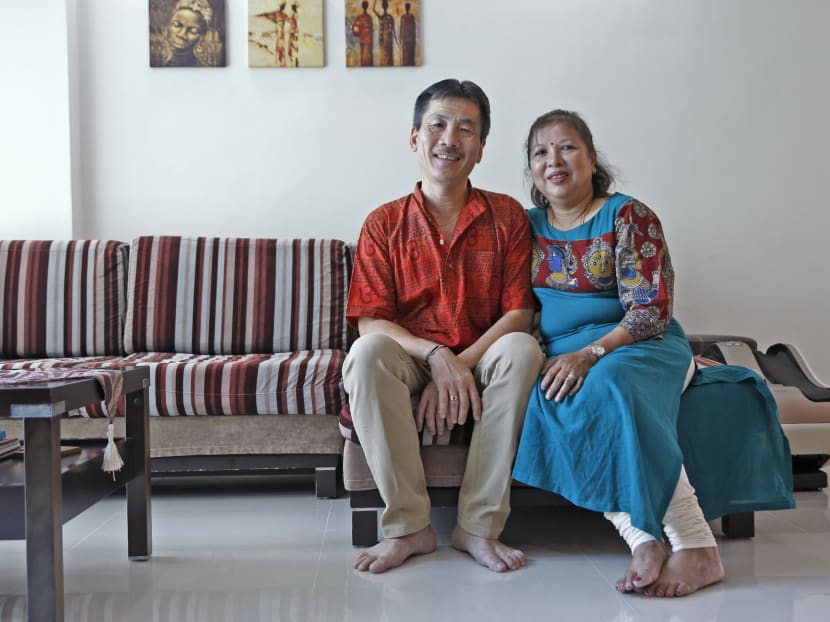Chinese by birth, Indian by adopted race
SINGAPORE — Mr Harry Koh Eng Whatt speaks fluent Tamil, found true love through an arranged marriage, and regards the Tamil Nadu village of Thirumakottai as his hometown, having been there 36 times in 37 years.

Harry Koh, seen here with his wife, speaks fluent Tamil. He was brought up by his Indian neighbour. Photo: Raj Nadarajan
SINGAPORE — Mr Harry Koh Eng Whatt speaks fluent Tamil, found true love through an arranged marriage, and regards the Tamil Nadu village of Thirumakottai as his hometown, having been there 36 times in 37 years.
If he had his way, the 57-year-old ethnic Chinese, who named himself Kannan Govindarajoo, would have his “race” changed from Chinese to Indian on the national register.
Orphaned at 19 and raised by Indian foster parents, Mr Koh told TODAY that race for him is not something he was born into, but adopted.
“I see myself as more of an Indian because my foster parents are Indians, my missus is Indian, and I have a lot of Indian friends. Nine in 10 of my friends are Tamilians,” said the Sim Lim Tower technician, who can barely muster a line in Mandarin.
But no one could tell this from looking at his Chinese face.
“Once, a stranger called me a ‘monkey’ in Tamil in a lift, I turned around and said (in Tamil): ‘Who is the monkey? You are the biggest monkey’ and walked off,” Mr Koh told TODAY with a chuckle.
Even his Chinese-Indian wife, Madam Santhi, felt she “married an Indian man”.
Her husband of 33 years still occasionally surprises her by using Tamil words she has never come across, singing Tamil songs and praying to Hindu gods like Murugan and Amman at an altar in their flat’s storeroom.
Their union came about through the “strictest” mode of Indian matchmaking. Mr Koh, then 24, and the then-21-year-old Mdm Santhi, first laid eyes on each other at the Registry of Marriages, where they signed their marriage certificate.
Even though their marriage was sealed on paper, they were not allowed to go out on their own for a year until friends and family witnessed their nuptials in a traditional Hindu ceremony, in which Mr Koh put on a veshti, a South Indian sarong-like skirt, for the first time.
“My mum saw him and liked him. So my brother (Mr Koh’s good friend) asked if he was keen. My father was a very serious and traditional man from Tiruchirapalli in India.
“He never allowed us to speak to each other,” recalled Mdm Santhi, an accounts executive.
When he received his friend’s proposal, Mr Koh was “shocked”. He told his friend he had to “think about it for a month” before he could give an answer.
“I went to talk to my foster parents, who noticed that I was acting weird all day,” said Mr Koh. “They said, if I’d like, they would go and take a look — the Indian customary way. They would go and see the bride, and the prospective bride’s family would come visit us, so the two families can establish an understanding (on the terms of the marriage).”
With that, the couple, who have no children, have been happily married for over three decades.
Mr Koh told TODAY that much of his fondness for the Indians could be attributed to his gratitude towards his foster family’s kindness when his birth mother, who became bedridden with stomach cancer when he was six, died a year later.
“Taking care of my mum was the most terrible thing … There’s a bell beside the bed, so when she rings, my foster mother would come. Their daughters would also help if she needed to be cleaned,” he said. “(After mum passed away), our Indian neighbour would look after my older brother and I until our dad came back (from work).”
Mr Koh’s father was a delivery man with Cold Storage, and his foster father, Mr Govindarajoo Pakkrisamy, was a supervisor in charge of the supermarket’s baking goods. They were neighbours in the workers’ quarters at Kampong Bahru Road.
When Mr Koh’s father died after an on-the-job accident when he was 19, Mr Koh, who was still a minor then, moved in with Mr Govindarajoo’s family. His 22-year-old elder brother, who was already supporting himself by then, got a rental house. They drew apart as a result.
But that did not sour the brothers’ relationship. Straddling both cultures, Mr Koh found that “race started to hold little meaning”. “Whether I am a Chinese or an Indian, it is the same. Nothing really changes in me … (At the end of the day,) we are one Singapore,” he said.








